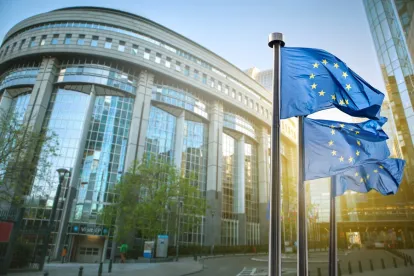On Nov. 17, 2021, the European Commission adopted a proposal for a Regulation on Deforestation-Free Products (RDFP or Regulation). The RDFP proposal is a key element of the European Green Deal (Green Deal), which sets an ambitious goal for the European Union to make Europe a climate-neutral continent by 2050, and to reduce greenhouse gas emissions by at least 55% by 2030 compared to 1990 levels.
The purpose of the RDFP is to ensure that only “deforestation-free” and legal – according to the laws of the country of origin – products are allowed on the EU market.
Businesses selling on – or exporting from – the EU market, and businesses established in the EU buying from non-EU businesses, cattle, meat, cacao, chocolate, other food preparations containing cacao, coffee, oil palm (palm oil, nuts, and kernels, and oilcake), and soya (soya beans, bean flour, meal, oil, and oilcake)1 are expected to be among those most impacted by the new legislation. These categories of businesses include those active in the food industry, since they are among the largest customers and/or suppliers of products covered by the RDFP. These businesses need to be – and remain – alert to the requirements, regulatory risk, and burden of the Regulation on their supply chains, and start planning for compliance with the forthcoming RDFP regulatory regime. Non-compliant businesses risk, e.g., goods being prevented from being sold on the EU market or suspended from sale.
Background to the Proposal and Link with Existing EU Policy and Instruments
According to the Commission, the RDFP proposal aims to prevent deforestation and forest degradation, which are occurring at an alarming rate, aggravating climate change and the loss of biodiversity. This would also imply a reduction of at least 31.9 million metric tons of carbon emissions to the atmosphere every year due to EU consumption and production of the commodities relevant to the Regulation, corresponding to economic savings of at least € 3.2 billion annually.
The RDFP proposal was first announced in the 2019 Commission Communication on Stepping up EU Action to Protect and Restore the World’s Forests, where (at p. 8) the Commission committed to: “Assess additional demand side regulatory and non-regulatory measures to ensure a level playing field and a common understanding of deforestation free supply chains, in order to increase supply chain transparency and minimize the risk of deforestation and forest degradation associated with commodity imports in the EU.” This commitment was then (re-)confirmed in the Green Deal, and in the 2030 EU Biodiversity Strategy and the Farm to Fork Strategy. The proposed RDFP is an integral part of – and consistent with – the overall objectives of the Green Deal and the initiatives developed thereunder.
Scope of the Proposed Regulation
Six commodities – cattle, cocoa, coffee, oil palm, soya and wood – and some of their derived products, e.g., meat, or chocolate, all set out in Annex 1 to the Regulation – are included in the RDFP’s scope. The Commission proposed these commodities and products based on findings in the Impact Assessment of the initiative. The assessment aimed at selecting the commodities through which European production and consumption have been contributing the most to global deforestation and forest degradation. Based on the findings, a cost-benefit analysis was conducted to further reduce the selection and define where an EU policy intervention could be efficient.
Nevertheless, the Commission has proposed an evolving scope of the commodities and products to be regulated, reviewing and updating the list regularly, considering new data. According to the Commission, this will allow adapting the RDFP to changing deforestation patterns. For example, maize is explicitly mentioned in the Impact Assessment, and could thus possibly one day fall within the scope of the Regulation.
The establishment of a “deforestation-free” definition is a novel aspect of the proposed RDFP. The definition of “deforestation-free” sets a cut-off date of Dec. 31, 2020, implying that no commodities and products within the Regulation’s scope would be allowed to enter or exit the EU market if they were produced on land subject to deforestation or forest degradation after that date. The date corresponds to international commitments to halt deforestation as, e.g., included in the Sustainable Development Goals (Goal 15.2).
The Proposed Regulation on Deforestation-Free Products in Practice
The proposed RDFP imposes a significant obligation on businesses that deal with the commodities and products covered by the Regulation.
As a result of the RDFP, relevant commodities and products may only be sold on – or exported from – the EU market or bought by businesses established in the EU from non-EU businesses, if all the following conditions are met:
-
they are “deforestation-free” (as defined above);
-
they have been produced in accordance with the relevant legislation of the country of production; and
-
they are covered by a mandatory due diligence statement.
To demonstrate that these conditions are met, businesses will be required to conduct mandatory due diligence – collecting information and documents, having risk assessment measures, as well as risk mitigation measures in place (e.g., satellite monitoring tools, or field audits) – and submit documentation to their national authority to be set up confirming compliance.
Under the Regulation, the principal burden falls on businesses that make available the relevant commodities and products on the EU market, export them from the EU, or buy them from non-EU businesses. That said, all other businesses in the supply chain supplying the relevant goods on the EU market for distribution, consumption, or use will also face compliance requirements.
A Commission benchmarking system will identify countries as presenting a low, standard, or high risk of producing commodities or products that are not “deforestation-free” or not in accordance with the legislation of the producer country. Obligations for businesses and authorities will vary according to the level of risk of the country or region of production, with more simplified due diligence duties for products coming from low-risk and enhanced scrutiny for high-risk areas.
The Regulation provides a list of penalties to be established in national legal systems for non-compliance. This list includes fines, the confiscation of the relevant commodities and products, as well as the confiscation of revenues, the suspension or prohibition of relevant economic activities, and the exclusion from public procurement processes for the businesses that infringe the Regulation. The proposed RDFP also requires that EU Member State legislation provide for a variable amount of the level of the fines depending on the annual revenues of the infringing businesses.
Conclusion
As stated above, this concerns a proposal. The RDFP is therefore still subject to discussion and review within the EU, and the final version may differ slightly or materially.
Companies importing, exporting, buying, or selling any of the goods in scope of the RDFP should understand the potential impact of the costs of the RDFP on their business process. Furthermore, companies must ensure the correct formalities are considered to comply with the RDFP and avoid potential penalties.
If the proposal is adopted without change, businesses will have to comply with all requirements of the RDFP as from 12 months from the entry into force of the Regulation.
1 As well as wood and wood products.




 />i
/>i

